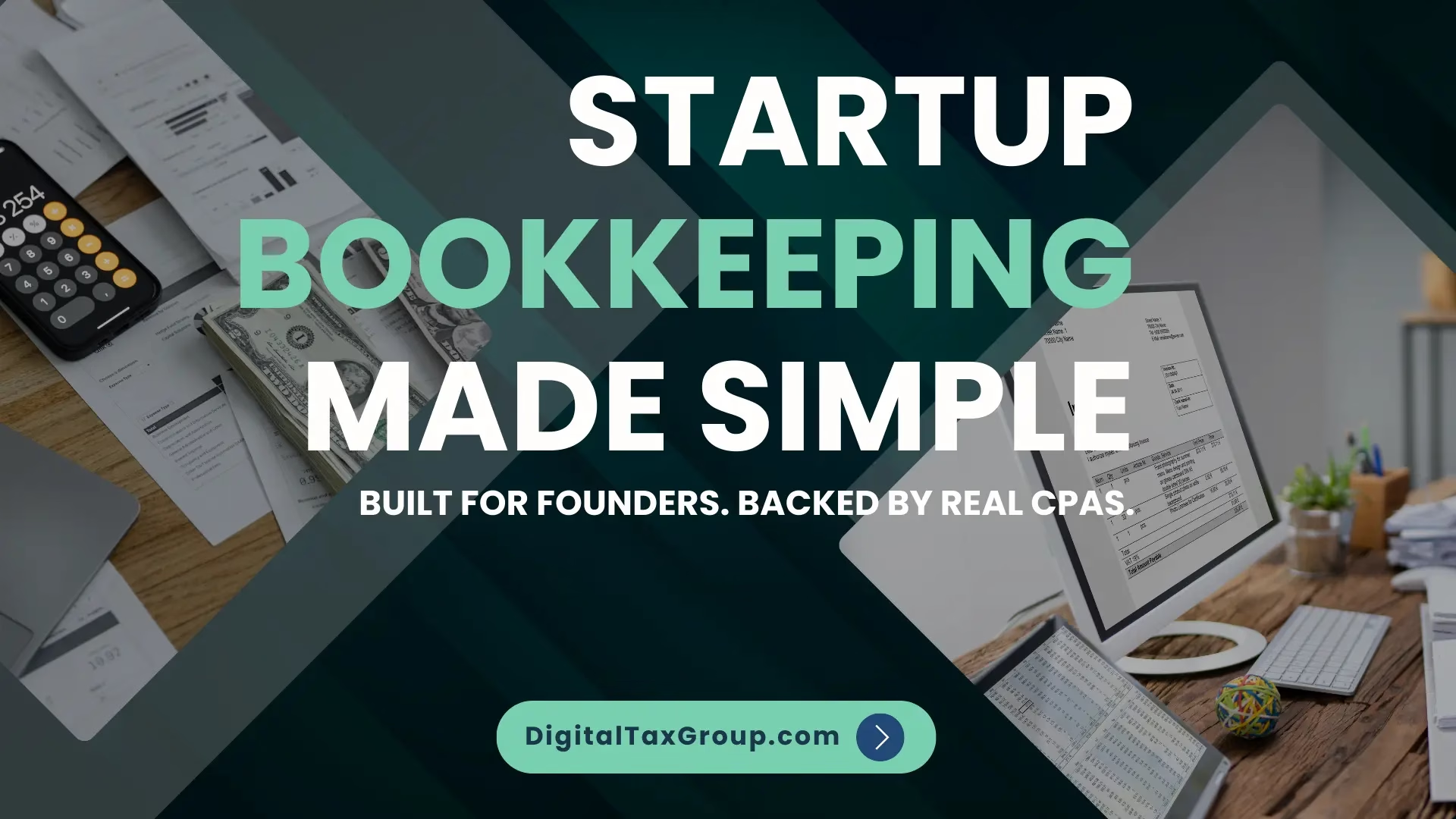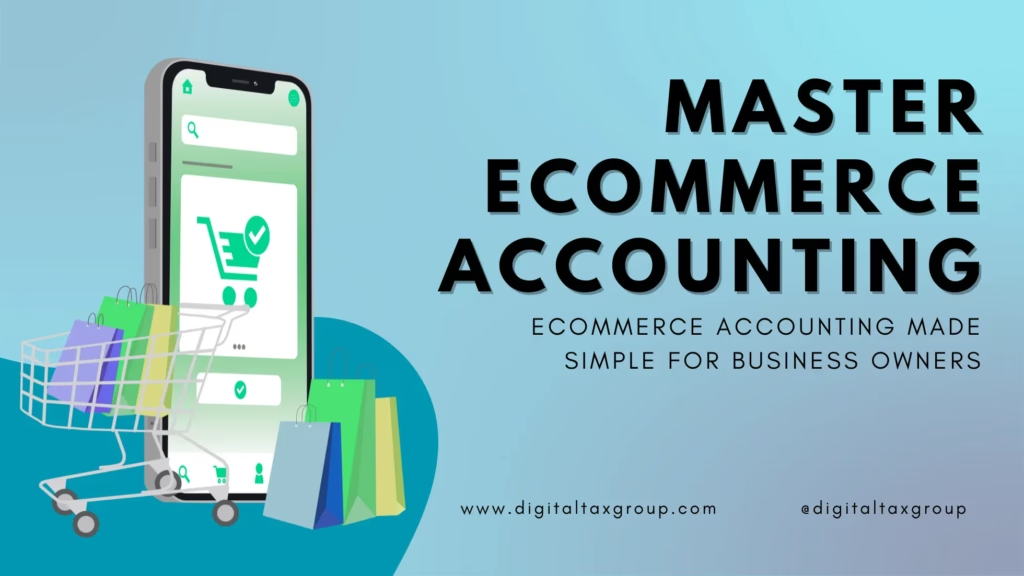Launching a startup is thrilling, but between developing your product and finding your market fit, it’s easy to overlook something that can make or break your business: bookkeeping for startups. Without a solid grasp of your numbers, your startup accounting can quickly spiral into confusion, leading to missed opportunities, compliance issues, or even worse, running out of cash.
From understanding basic bookkeeping to choosing the right bookkeeping service provider, this guide walks you through everything you need to know about building a solid accounting foundation for your startup in 2025.

Understanding Bookkeeping and Accounting for Startups
Startups have unique needs, especially when it comes to bookkeeping and accounting. The difference between a business that scales and one that stalls often lies in its accounting practices.
Bookkeeping for startups involves tracking every dollar in and out of the business. It helps startup founders create financial statements, monitor burn rate, and ensure tax compliance. More importantly, proper startup bookkeeping reveals your company’s financial health in real time, which is critical for both strategic decision-making and investor conversations.
Accounting, on the other hand, takes those numbers and gives them meaning. It involves analyzing your accounting records, calculating performance metrics, and identifying ways to optimize your business model. Together, accounting and bookkeeping services provide the insight needed to run lean, adapt fast, and grow smart.
Why Startups Need Solid Bookkeeping from Day One
When you’re running a startup, accurate books are more than just a legal requirement—they’re your roadmap. The truth is, startups need accountants early to build the structure that will support growth later.
Bookkeeping also supports basic accounting tasks such as:
-
Generating monthly financial statements
-
Tracking key KPIs
-
Preparing for fundraising or audits
-
Managing accounting needs across business units
If you’re unsure where to begin, Digital Tax Group in Miami offers bookkeeping services for startups, tailored to meet your exact needs. View the complete list of services.
Choosing the Right Accounting Method
Startups often default to cash basis accounting because it’s simple, but that simplicity can lead to blind spots. On the other hand, accrual accounting provides a more complete picture of your financial situation by recording revenues and expenses when they’re incurred, not when cash changes hands.
Understanding your accounting method early helps avoid costly changes later. Accrual accounting is ideal for funded startups or any business with long-term growth plans. It supports generally accepted accounting principles and enables better forecasting.
For guidance on which accounting method is best for your stage, you can book a consultation with Digital Tax Group.
Don’t DIY When You Don’t Have To
Sure, diy accounting tools and spreadsheets might seem like a good place to start, but as your startup grows, the complexity multiplies. Bookkeeping can be time-consuming, especially when you’re juggling multiple roles as a startup founder.
The right move? Partner with a professional. Schedule a call or email [email protected] to connect with an accounting professional who understands startups and small business dynamics.
Have questions now? Give them a call at 305-441-2105 or contact them directly.

Tools and Software Options for Startup Accounting
Choosing an Accounting Software Platform for Your Startup
Every startup reaches a moment where Excel sheets no longer cut it. Whether you’re managing bookkeeping tasks, tracking expenses, or preparing financial statements, adopting the right accounting software for startups is non-negotiable.
There are dozens of tools out there, but not all are designed for startups. Your accounting system should simplify operations, not complicate them. Here are a few key features to look for in a platform:
-
Cloud-based access for remote teams
-
Real-time dashboard for business accounting insights
-
Seamless bank and credit card integrations
-
Multi-user permissions for your accounting team
-
Integration with bookkeeping services for startups
| Feature | Why It Matters for Startups |
|---|---|
| Real-time Reporting | Startups can access their financial data instantly |
| Automation | Reduces time spent on accounting tasks |
| Scalability | Grows with your company’s bookkeeping needs |
| Budgeting Tools | Essential for planning and projections |
| Compliance | Keeps your startup accounting aligned with tax laws |
Choosing the right bookkeeping software early will save time, stress, and potentially thousands in avoidable errors.
Popular Bookkeeping Software Like QuickBooks
Let’s talk names. QuickBooks and QuickBooks Online are top-tier choices for many early-stage startups, known for intuitive design and robust features. For small business accounting software, it’s often the go-to. But that doesn’t mean it’s the only choice.
Other solid platforms include:
-
FreshBooks – Great for service-based businesses
-
Zoho Books – Affordable and customizable
-
Wave – A strong diy accounting option for solopreneurs
The best bookkeeping services often integrate with tools like these. Digital Tax Group frequently supports clients using accounting software like QuickBooks as part of their comprehensive bookkeeping packages.

Bookkeeping Services for Startups: What to Expect
In-House vs. Outsourced Bookkeeping for Startups
Should you hire internally or opt for outsourced bookkeeping? While both can work, most startups and small teams don’t have the resources or time to build a full finance department in-house.
Here’s a quick breakdown:
| Option | Pros | Cons |
|---|---|---|
| In-House Bookkeeper | Control, availability | High salary, overhead |
| Outsourced Bookkeeping | Cost-effective, expertise, and scalability | Less immediate access |
Most founders find outsourced bookkeeping to be the ideal option for startups looking to stay lean without sacrificing accuracy. A skilled bookkeeping service provider ensures compliance, optimizes bookkeeping and accounting, and helps build a solid accounting structure without the overhead.
What the Best Bookkeeping Services Offer Startups
So, what should startup founders look for when scouting the best bookkeeping services?
-
Custom plans tailored to startup needs
-
Support with tax services, financial statements, and reporting
-
Integration with your current bookkeeping software
-
Help navigating accrual accounting and other accounting methods
-
Assistance with choosing the best accounting software platform
At Digital Tax Group, the focus is on helping startups scale confidently. From setup to monthly reports, their accounting and bookkeeping services are designed for growth. Book a consultation today to explore how they can meet your unique accounting needs.
How to Choose the Right Bookkeeping Service
Critical Factors Startups Should Consider
Finding the right bookkeeping service is a decision that affects your startup’s financial clarity, legal compliance, and ability to grow. Not all bookkeeping service providers are created equal, and for startups, that difference matters even more.
Here’s what to look for when evaluating options:
-
Experience with startups and small businesses
-
Familiarity with accounting software like QuickBooks
-
Flexible pricing based on your current size
-
Transparent reporting and communication
-
Ability to scale as your startup grows
“The success of your startup often depends on the strength of your financial foundation. Choosing an accounting partner who understands startups is not optional—it’s essential.”
For startups looking for trusted professionals, Digital Tax Group is a proven choice. Based in South Miami, their team provides personalized bookkeeping and tax support that scales with your company. Meet Ian Borbolla, CPA, the firm’s founder and Principal CPA.

Why the Right Bookkeeping Software and Service Matters
Startups have unique trajectories, and as your operations become more complex, your accounting and bookkeeping must evolve. The best firms offer more than just basic accounting—they provide a roadmap for financial success.
With the right support, startups can:
-
Avoid compliance risks
-
Produce clean, audit-ready financial statements
-
Maintain organized accounting records
-
Plan confidently with a reliable accounting team
And when it comes to software, selecting the right bookkeeping software is just as important. A good tool must work hand-in-hand with your service provider.
Top integrations to prioritize include:
-
Bank syncing
-
Automated invoice tracking
-
Real-time financial dashboards
-
Role-based user access for startup accounting teams
Need help getting started? Schedule a free consultation to evaluate your options.
Do-It-Yourself vs. Professional Accounting for Startups
When DIY Accounting Works and When It Doesn’t
Diy accounting might seem like a cost-saving solution for new founders. And in some scenarios, it works—especially when your transactions are minimal and you have a strong financial background.
But as your startup grows, bookkeeping can be time-consuming and error-prone. Even the best spreadsheets can’t match the precision of an expert-managed accounting system. Missed deductions, miscategorized expenses, and compliance errors can cost you far more than you save.
| DIY Accounting | Professional Support |
|---|---|
| Low initial cost | High accuracy |
| Great for early ideation stage | Ideal for scaling and funded startups |
| Requires your time | Frees you to focus on growth |
| Limited in-depth insight | Expert analysis and strategy |
“Accounting can help more than just your books—it can help shape your business strategy.”

When to Hire an Accountant or CPA
You don’t need to wait until tax season to hire an accountant. In fact, startups need accountants before financial problems emerge.
Here’s when to bring in a pro:
-
You’re generating consistent revenue
-
You’re planning to raise funding
-
You’re scaling your team
-
You need help with tax services or filing
-
You’re unsure how to set up your bookkeeping system
An accounting professional helps ensure solid accounting practices are in place from day one, including choosing the right accounting method, setting up basic accounting workflows, and preparing for long-term growth.
Ready to outsource the stress? Contact Digital Tax Group or email them at [email protected] to get expert help.
The Future of Bookkeeping Services in 2025 and Beyond
Trends Shaping Bookkeeping Services for Startups
As we move further into the digital age, bookkeeping services in 2025 are no longer limited to spreadsheets and manual entry. Instead, they’re powered by automated fintech and accounting platforms that help startups stay nimble, compliant, and fully informed.
Startups now have access to:
-
Real-time data through cloud accounting software
-
AI-driven insights for budgeting and forecasting
-
Automated reconciliation and reporting tools
-
End-to-end bookkeeping and accounting services
These innovations allow founders to focus less on number crunching and more on growth. But tech alone isn’t the answer—solid accounting still relies on good advice, proper setup, and tailored strategy.
That’s where experienced firms like Digital Tax Group bridge the gap between innovation and insight. Whether you’re navigating accrual accounting, preparing financial statements, or launching your first product, the right partner is key.

Why Digital Tax Group is Ideal for Startups
With an office based in South Miami, Digital Tax Group is more than just another accounting firm. They specialize in services for startups—offering everything from startup bookkeeping services to full-scale accounting and bookkeeping strategies.
Whether you’re a solo founder juggling invoices or a funded team scaling fast, DTG offers:
-
Expert guidance tailored to startup accounting and bookkeeping
-
Hands-on support choosing the best bookkeeping software
-
Help establish accounting records and solid accounting foundation
-
Personalized attention that large accounting firms simply can’t provide
You can meet Ian Borbolla, the firm’s Principal CPA and a trusted expert for startup needs. His approach is straightforward and rooted in helping founders thrive.
Ready to work with professionals who understand startups?
-
Book a consultation today
-
Call 305-441-2105 for immediate support
-
Email [email protected]
-
Visit the contact page to send a message
“When you’re building something from the ground up, your financial structure shouldn’t be an afterthought—it should be part of the blueprint.”
Digital Tax Group helps startups make informed decisions, minimize risks, and keep finances crystal clear. Whether you’re in the early ideation phase or preparing for Series A, choosing the right bookkeeping service isn’t just an expense—it’s an investment in your future.



